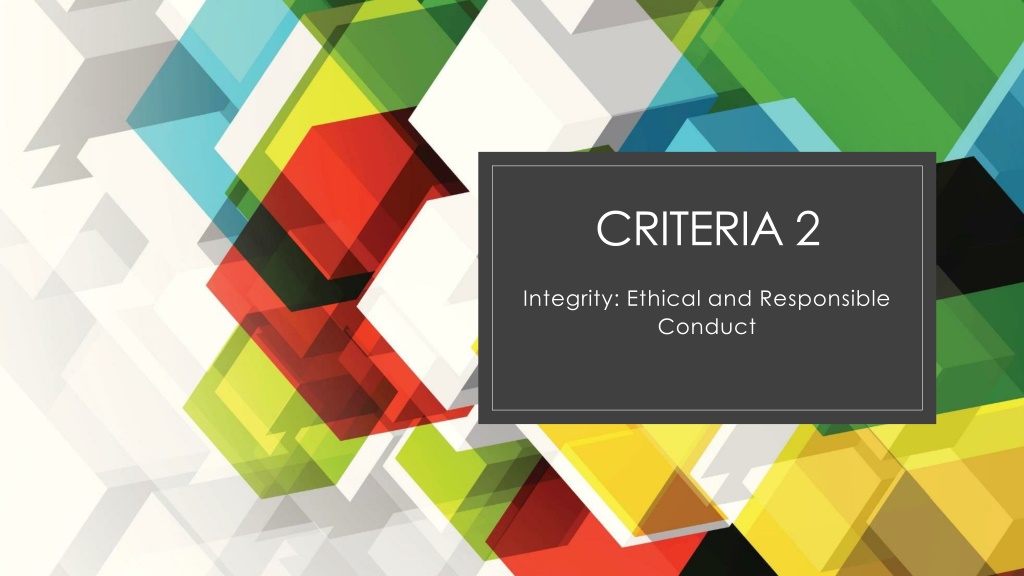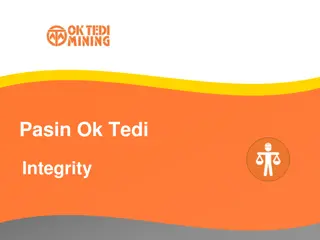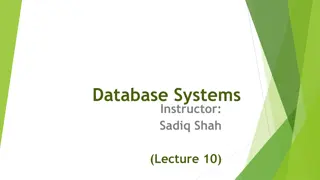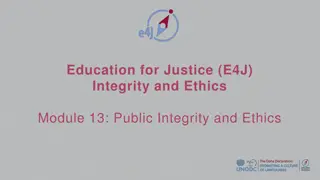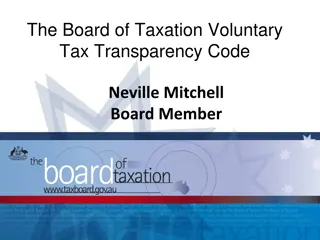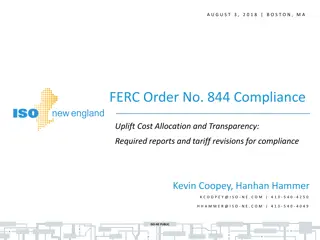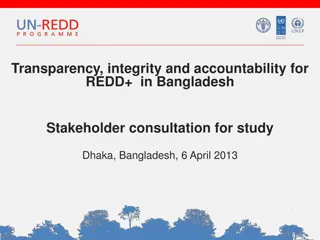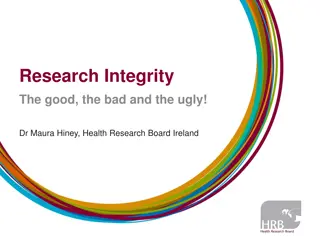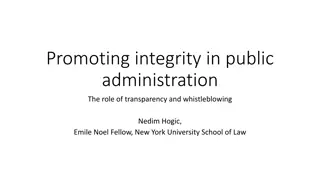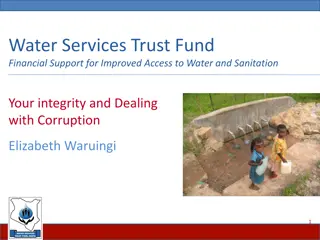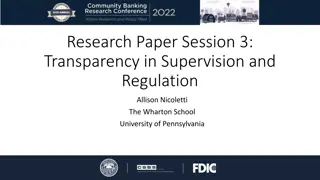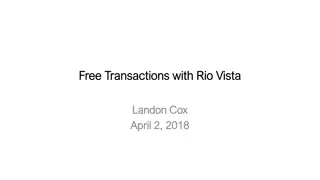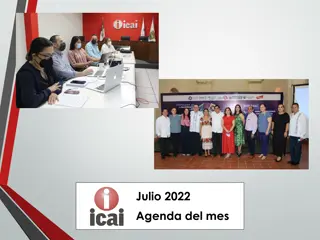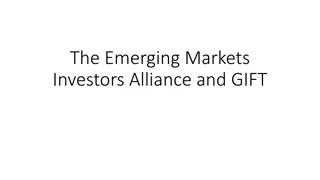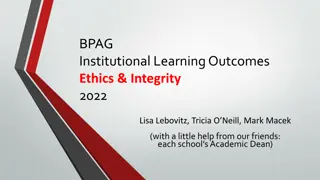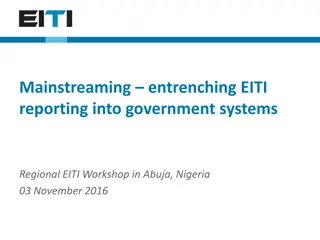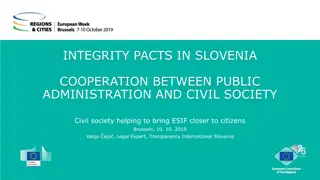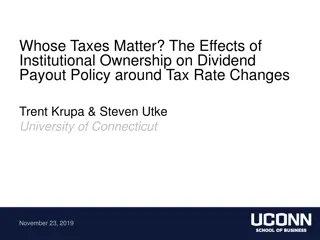Institutional Integrity and Transparency Practices
Upholding integrity, ethical conduct, and transparency in education institutions is crucial. This involves establishing and following policies to ensure fair behavior among the governing board, administration, faculty, and staff. The institution should operate with integrity in financial, academic, and human resource functions, as well as through shared governance practices. Transparency is also key in presenting clear and complete information to students and the public, through college catalogs, websites, and communication materials.
Download Presentation

Please find below an Image/Link to download the presentation.
The content on the website is provided AS IS for your information and personal use only. It may not be sold, licensed, or shared on other websites without obtaining consent from the author. Download presentation by click this link. If you encounter any issues during the download, it is possible that the publisher has removed the file from their server.
E N D
Presentation Transcript
CRITERIA 2 Integrity: Ethical and Responsible Conduct
THE INSTITUTION ACTS WITH INTEGRITY; ITS CONDUCT IS ETHICAL AND RESPONSIBLE 2.A: The institution establishes and follows policies and processes to ensure fair and ethical behavior on the part of its governing board, administration, faculty, and staff Focus on education drives the daily operations quality education Discussion of Board of Directors meetings, members, election of members
2.A CONTINUED Development and adoption of the mission Shared Governance review Board adoption Operates with integrity financial, academic, human resources, and auxiliary functions Policies in place grade records (integrity), grade changes, final grades, incomplete grades FERPA Withdrawal process Transcription of grades
OPERATES WITH INTEGRITY.. Shared Governance Councils review board policies Fiscal Integrity Audit processes No issues with audits
INTEGRITY.. Integrity of constituents Student handbook, employee handbook, master agreement, collective bargaining agreement Public board meetings, program reviews, high school surveys Student code of conduct Athletic code of conduct Faculty qualification Faculty orientation
2.B: THE INSTITUTION PRESENTS ITSELF CLEARLY AND COMPLETELY TO ITS STUDENTS AND THE PUBLIC Transparency, accuracy, and consistency College Catalog (how and when it is reviewed) Communication tool for Policies Procedures Costs Program requirements Course descriptions
2.B CONTINUED College website Responsible parties for keeping it up to date Everyone! Social Media Marketing Materials Goal of marketing materials is to accurately reflect mission, vision, values, culture, and rigor and of course the non-discrimination statement
CONTINUED. Triton Pride- publication Student Handbook- review process Institutional Effectiveness Resource for ALL data Tuition and Fees Catalog, marketing materials, website Fees are only charged if announced ahead of time Net price calculator
2.C: THE GOVERNING BOARD OF THE INSTITUTION IS AUTONOMOUS TO MAKE DECISIONS IN THE BEST INTEREST OF THE INSTITUTION IN COMPLIANCE WITH BOARDPOLICIES AND TO ENSURE THE INSTITUTIONS INTEGRITY Board of Directors Training opportunities Professional development Decisions: curriculum, policies, procedures, hiring College President Board policies that pertain specifically to the Board; 104, 105 Iowa Code Chapter 260C
2.D: THE INSTITUTION IS COMMITTED TO ACADEMIC FREEDOM AND FREEDOM OF EXPRESSION IN THE PURSUIT OF TRUTH IN TEACHING AND LEARNING Board Policy 224 Discuss how academic freedom and freedom of expression are respected at Iowa Central Community College Discuss: Assessments Methods of evaluation Required and supplemental course materials Delivery of material in the classroom
CONTINUED. Outside speakers to enhance diversity Examples given: Presidential candidates, 4-year college admission reps, DSAOC staff Code of Conduct Board Policy 406 The Collegian
2.E: THE INSTITUTIONS POLICIES AND PROCEDURES CALL FOR RESPONSIBLE ACQUISITION, DISCOVERY AND APPLICATION OF KNOWLEDGE BY ITS FACULTY, STAFF, AND STUDENTS Faculty research Commitment to helping students SDV 116 Strategies of Online Success MLA and APA formatting SDV 108 ENG 105 ENG 106
CONTINUED. Scholastic Dishonesty Policy Student Handbook Instructor Course Policy Handout Provides definitions of cheating, plagiarism, and other academic misconduct Alert System (email helps prevent systemic cheating and plagiarism) Data base licenses GALE, CINAHL, Kanopy, Statista, EbscoHost, etc.) Taught in College Experience course
CONTINUED Communications Department courses Quoting Paraphrasing Citing Formatting, Using databases Research Turnitin
SUMMARY OF CRITERIA 2 Directed by a governing board High standard of integrity and ethical conduct Undergo training workshops, conferences, etc. Main operations of the Board led by the Constitution, Iowa Code, and Iowa Department of Education College a multitude of policies and procedures that guide the practices of all stakeholders for ethical and responsible conduct. Operate with integrity in its financial, academic, human resources, and auxiliary functions with the use of policies and procedures
CONTINUED Ensure accuracy of information Hold ALL stakeholders to a high standard of integrity and ethical conduct Open-door institution encourage diversity in all practices Curricular Co-curricular Extra-curricular Non-credit Academic freedom, discovery and application of knowledge, and freedom of speech are respected components of the institution.
